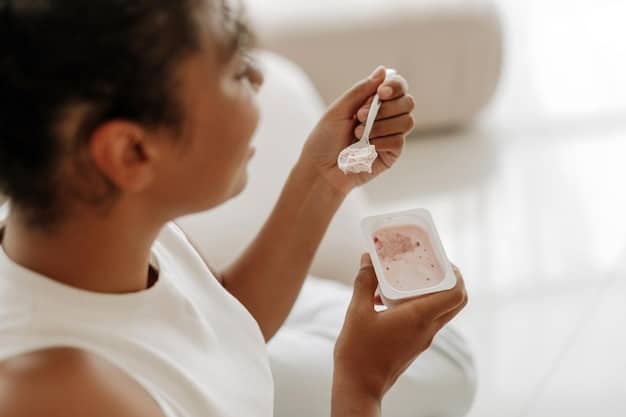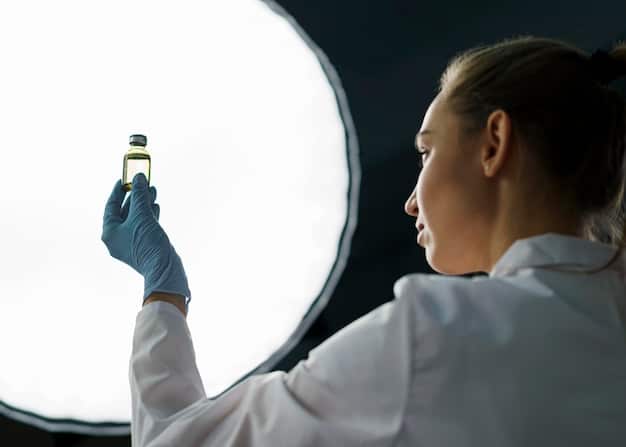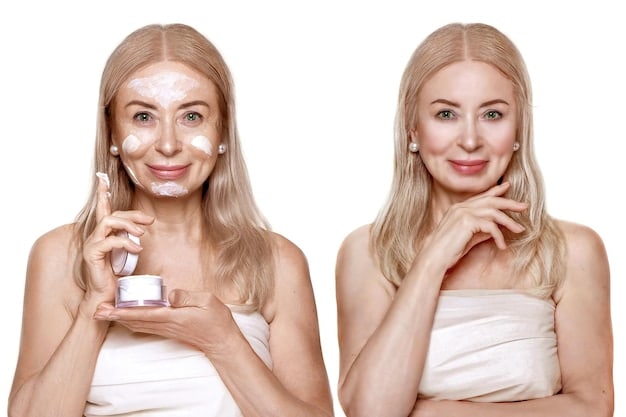Anti-Aging Creams: Unveiling the Truth & Effective Solutions

The Truth About Anti-Aging Creams: Separating Fact from Fiction and Finding Products That Actually Work involves understanding ingredients, scrutinizing marketing claims, and choosing products backed by scientific research to effectively address signs of aging.
Navigating the world of anti-aging creams can feel like wading through a swamp of empty promises and misleading marketing. The Truth About Anti-Aging Creams: Separating Fact from Fiction and Finding Products That Actually Work requires a discerning eye and a solid understanding of what ingredients truly make a difference.
Understanding the Anti-Aging Industry: Hype vs. Reality
The anti-aging industry is a multi-billion dollar market, flooded with products promising to turn back the clock. Sorting through the hype to find what’s genuinely effective is crucial for consumers seeking real results.
The Power of Marketing: How Claims are Made
Marketing plays a significant role in the success of anti-aging creams. Clever wording and celebrity endorsements can obscure the reality of a product’s effectiveness.
- Understanding the language used in advertisements is essential. Look beyond promises of “instant results” or “complete rejuvenation.”
- Research the ingredients and see if there’s any scientific rationale behind the claims made in a product’s marketing materials.
- Be wary of “before and after” photos, as these are often heavily edited or taken under specific lighting conditions, which can change the skin’s appearance.
The Role of Regulation and Scientific Evidence
The FDA regulates cosmetics to ensure they are safe for use, but it does not require pre-market approval for most products. It is important to look for products with credible third-party scientific validation to ensure legitimate claims.
- Look for clinical studies published in reputable scientific journals that provide evidence of a product’s effectiveness.
- Be skeptical about products that rely solely on anecdotal evidence or testimonials.
- Check for certifications from reputable organizations, which may indicate that a product has met certain standards for quality and purity.
In conclusion, the anti-aging industry can be deceptive, but by being an informed consumer, you can make smarter choices. Focus on products backed by science, not just marketing hype.
Key Ingredients in Effective Anti-Aging Creams
Not all anti-aging creams are created equal. The effectiveness of a cream largely depends on the quality and concentration of its active ingredients. Selecting products with proven ingredients is critical.

Retinoids: The Gold Standard
Retinoids, derivatives of vitamin A, are considered the gold standard in anti-aging ingredients. They work by increasing cell turnover, boosting collagen production, and reducing the appearance of wrinkles and fine lines.
- Retinol is a popular over-the-counter retinoid that converts to retinoic acid in the skin.
- Prescription retinoids, like tretinoin, are more potent and can deliver faster results.
- When beginning retinoid use, start with a low concentration and gradually increase as tolerated to minimize irritation.
Peptides: Building Blocks of Youth
Peptides are short chains of amino acids that act as building blocks for proteins like collagen and elastin. They can stimulate collagen production, improve skin elasticity, and reduce the appearance of wrinkles.
- Look for products containing peptides like palmitoyl pentapeptide-4 or copper peptides.
- Peptides are generally well-tolerated and can be a good option for those with sensitive skin.
Antioxidants: Protecting Against Environmental Damage
Antioxidants protect the skin from damage caused by free radicals, unstable molecules that can accelerate aging. Ingredients like vitamin C, vitamin E, and green tea extract can help neutralize free radicals and prevent premature aging.
In summary, the right ingredients can make a significant difference in the effectiveness of anti-aging creams. Prioritize retinoids, peptides, and antioxidants for the best results.
Understanding Your Skin Type: Choosing the Right Cream
Selecting the right anti-aging cream isn’t just about ingredients; it’s also about understanding your unique skin type and its specific needs. What works for one person might not work for another.
Dry Skin: Hydration is Key
Dry skin often lacks moisture, which can exacerbate the appearance of wrinkles and fine lines. Look for creams that are rich in hydrating ingredients like hyaluronic acid, glycerin, and ceramides.
Avoid products that contain harsh ingredients like alcohol, which can further dry out the skin. Choose creams with a thicker consistency for optimal hydration.
Oily Skin: Lightweight Formulas are Best
Oily skin is prone to breakouts and clogged pores, so it’s important to choose lightweight, non-comedogenic formulas that won’t clog pores. Look for creams that contain ingredients like salicylic acid or niacinamide to help control oil production.
Gel-based or oil-free creams are often a good choice for oily skin, as they provide hydration without adding excess oil.
Sensitive Skin: Gentle Ingredients are Crucial
Sensitive skin is easily irritated, so it’s important to choose creams that are free of fragrances, dyes, and other potential irritants. Look for products that contain soothing ingredients like aloe vera, chamomile, or allantoin.
Patch-testing a new product on a small area of skin before applying it to the entire face is always a good idea if one has sensitive skin.

In short, knowing your skin type is essential for choosing the right anti-aging cream. Tailor your skincare routine to address your skin’s unique needs and concerns.
Lifestyle Factors That Impact Skin Aging
While anti-aging creams can help improve the appearance of your skin, they are not a magic bullet. Lifestyle factors play a significant role in how your skin ages. Adopting healthy habits can complement your skincare routine and enhance your results.
The Importance of Sun Protection
Sun exposure is one of the leading causes of premature aging. UV rays damage collagen and elastin fibers, leading to wrinkles, age spots, and loss of elasticity. Wearing sunscreen every day, even on cloudy days, is essential for protecting your skin from sun damage.
- Choose a broad-spectrum sunscreen with an SPF of 30 or higher.
- Apply sunscreen liberally to all exposed areas of skin, including the face, neck, and hands.
- Reapply sunscreen every two hours, especially if you are swimming or sweating.
Nutrition and Hydration
What you eat and drink can also affect your skin’s health and appearance. A diet rich in fruits, vegetables, and antioxidants can help protect your skin from damage and promote collagen production. Staying hydrated by drinking plenty of water is also essential for maintaining skin elasticity and preventing dryness.
Avoid processed foods, sugary drinks, and excessive alcohol consumption, as these can contribute to inflammation and accelerate aging.
Sleep and Stress Management
Getting enough sleep and managing stress are also important for maintaining healthy, youthful-looking skin. During sleep, your body repairs and rejuvenates itself, so a lack of sleep can lead to dull, tired-looking skin. Stress can also contribute to inflammation and accelerate aging. Practice stress-reducing activities like yoga, meditation, or spending time in nature to help keep your skin looking its best.
In simple terms, healthy lifestyle that includes sun protection, good nutrition, and stress management can help slow down the aging process.
How to Incorporate Anti-Aging Creams into Your Routine
Knowing which anti-aging creams to buy is only half the battle. Incorporating them into your daily routine correctly is essential for maximizing their effectiveness and avoiding irritation.
Developing a Consistent Skincare Routine
Consistency is key when it comes to skincare. Developing a daily routine and sticking to it can help improve the appearance of your skin over time. A basic skincare routine typically includes cleansing, toning, moisturizing, and applying sunscreen.
Incorporate anti-aging serums and creams into your routine after cleansing and toning, but before moisturizing. This allows the active ingredients to penetrate the skin more effectively.
Layering Products Correctly
Layering products in the correct order is critical for optimal absorption and effectiveness. As a general rule, apply products from thinnest to thickest consistency. Start with serums, followed by lotions, and finish with creams or oils.
Allow each product to fully absorb into the skin before applying the next one. This helps prevent pilling or clumping.
Potential Side Effects and How to Manage Them
Some anti-aging ingredients, like retinoids, can cause side effects like dryness, redness, and peeling. To minimize these side effects, start with a low concentration and gradually increase as tolerated. Use a gentle moisturizer to hydrate the skin and avoid using other potentially irritating products at the same time.
If you experience severe irritation, discontinue use and consult with a dermatologist.
Ultimately, building a consistent routine is what you want in order to make sure the anti-aging creams do their job.
Expert Opinions and Dermatologist Recommendations
It is important to consult with skin care professionals who may shed light on what truly works and what common misconceptions should be dismissed.
Seeking Professional Advice
Consulting with a dermatologist or skincare professional can provide personalized recommendations based on your skin type, concerns, and goals. They can help you choose the right products and develop a customized skincare routine that meets your specific needs.
A dermatologist can also assess your skin for any underlying conditions that may be contributing to premature aging and recommend appropriate treatments.
Debunking Common Myths
There are many myths surrounding anti-aging creams. For example, some people believe that more expensive products are always better or that you need to start using anti-aging creams in your 20s to prevent aging. These beliefs are not always true.
- The effectiveness of a product depends more on its ingredients than its price tag.
- While preventative skincare is important, you don’t need to start using anti-aging creams until you notice the first signs of aging, such as fine lines or wrinkles.
Highlighting Recommended Products and Brands
Dermatologists often recommend products from reputable brands that are backed by scientific research. Look for brands that prioritize quality, safety, and effectiveness over marketing hype.
| Key Point | Brief Description |
|---|---|
| 🔍 Industry Reality | Separate hype from science; informed choices matter. |
| 🧪 Key Ingredients | Retinoids, peptides, antioxidants: essential for efficacy. |
| ☀️ Lifestyle Factors | Sun protection, nutrition, sleep: key for skin health. |
| 🧴 Skin Type | Dry needs hydration; oily prefers light formulas; sensitive requires gentle products. |
Frequently Asked Questions (FAQ)
▼
Yes, some anti-aging creams work by reducing the appearance of wrinkles. However, individual results vary. The efficacy lies in certain ingredients and consistent usage.
▼
It’s recommended to start in your late 20s or early 30s. Preventative care is key, so starting before wrinkles form is beneficial. Look towards skin and health.
▼
Not necessarily. Effectiveness depends on the ingredients more than the price. Look for creams with a strong mix of vitamins and nutrients.
▼
No, they can’t reverse aging, but they help reduce signs of aging and improve skin appearance, resulting in healthier looking skin to some extent.
▼
Look for retinoids, peptides, antioxidants, and hyaluronic acid. These are proven effective for improving skin health and appearance; results vary based on skin.
Conclusion
In conclusion, navigating the world of anti-aging creams requires understanding the facts, recognizing the best ingredients for unique skin conditions, and incorporating the products into a healthy lifestyle to improve your skin’s health and look.





